By Jim Davis - Florida Catholic
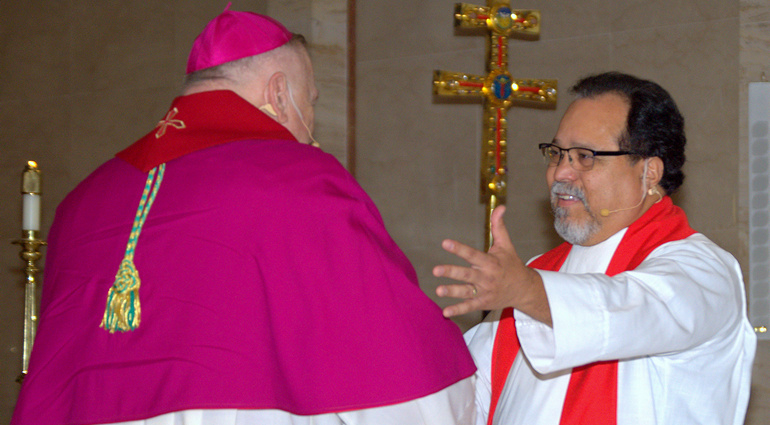
Photographer: Jim Davis
Archbishop Thomas Wenski, left, and Lutheran Bishop-elect Pedro Suarez embrace during the Common Prayer service for Reformation 500 at St. Mary Cathedral.
MIAMI | Two chief shepherds -- one Catholic, one Lutheran -- shared a big hug on Oct. 29, embodying a new closeness between their religious groups during a historic interchurch prayer service at St. Mary Cathedral.
The embrace -- between Archbishop Thomas Wenski of Miami and Bishop-elect Pedro Suarez, the next head of the Florida-Bahamas Synod of the Evangelical Lutheran Church in America -- took place at the culmination of Reformation 500, a year of observances for the 500th anniversary of the Protestant Reformation.
Unlike the Reformation itself, however, the service celebrated not the division between Catholic and Protestant Christians, but 50 years of ecumenical goodwill -- and a pledge on both sides to keep it going.
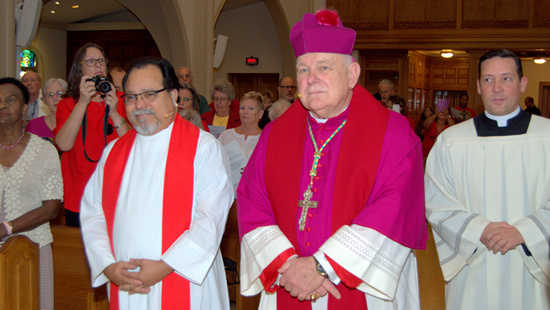
Photographer: Jim Davis
Lutheran Bishop-elect Pedro Suarez, left, and Archbishop Thomas Wenski walk side by side in procession during the Common Prayer service for Reformation 500 at St. Mary Cathedral. At far right is the Rev. Richard Vigoa, the archbishop's priest-secretary.
"After 500 years, we have rediscovered a real if imperfect communion between us," Archbishop Wenski said to his 250 listeners, many of them from Lutheran churches. "We resolve to strengthen what we hold in common and, with holy impatience, seek to build unity."
Bishop-elect Suarez, who was chosen on Oct. 14 and will be installed in January, agreed.
"The bottom line is that we're both proclaiming the gospel of Jesus Christ," he said in an interview before the service. "People are experiencing hopelessness and fear. When they see two churches who were polarized coming together, it brings hope to everybody."
The service followed the liturgy known as "Common Prayer," first used in Lund, Sweden, on Oct. 31, the anniversary of Martin Luther's publication of 95 theses against Catholic authority. The service, led by Pope Francis and top officials of the Lutheran World Federation, launched a worldwide series of similar services between bishops of the two church bodies.
Guided by the 10-page liturgy, the congregation at St. Mary sang hymns, recited responsive scriptural readings and joined in prayer. They also recited the Apostles' Creed and sang the Kyrie Eleison prayer, asking for divine mercy.
Repenting of the walls
Readers lamented the "burdens of the guilt of the past" for divisions among believers: "As communities and as individuals, we build many walls around us: mental, spiritual, physical, political … Lord, have mercy."
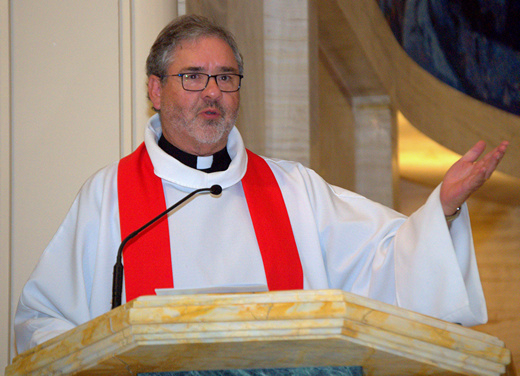
Photographer: Jim Davis
The Rev. Walter Still delivers a message during the Common Prayer service for Reformation 500 at St. Mary Cathedral. He is chair of the Reformation 500 Committee for the Florida-Bahamas Synod of the Evangelical Lutheran Church in America.
Finally, the congregation heard the five key "Imperatives" from the watershed 2013 Lutheran-Catholic document "From Conflict to Communion." The statements included pledges for Catholics and Lutherans to seek visible unity, to proclaim the gospel together, to approach their relationship from the view of unity and not division, to persist in the work and to "jointly rediscover the power of the gospel of Jesus Christ for our time."
Then came the traditional Sign of Peace and the embrace of the bishops. That prepared everyone to say the Lord's Prayer.
Music, too, was ecumenical. It featured the Taize hymn "Veni Sancte Spiritus" by Jacques Berthier, plus a new meditative "Alleluia" chorus by Rachel Currea of Coral Gables, part of a CD released for Reformation 500 in September.
The 50 singers included St. Mary's choir and Miami Collegium Musicum, a community choir formed this summer. Alternating as conductors were Gustavo Zayas, archdiocesan music director, and Donald Oglesby, director of the collegium.
Even the sermon was shared, between Archbishop Wenski and the Rev. Walter Still, Reformation 500 chair for the ELCA synod.
Stopping the stones
"In our lifetime, there were times when it was acceptable for Lutheran kids to throw stones at Catholic kids, and Catholic kids threw them back at us," Rev. Still said. "Catholic moms and dads told their kids that they should never date a Protestant, while Protestant parents instilled similar stereotypes in their children’s hearts and minds."
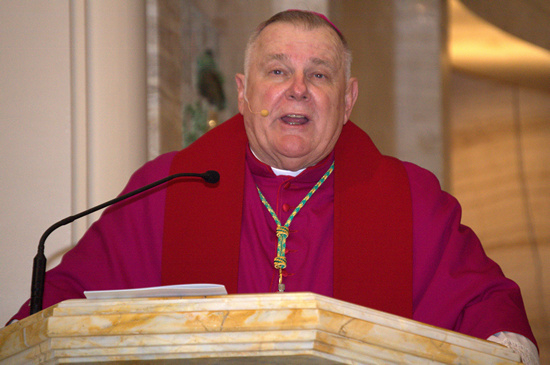
Photographer: Jim Davis
Archbishop Wenski gives a message during the Common Prayer service for Reformation 500 at St. Mary Cathedral.
What changed, he said, was a recognition of the need to obey Christ's command "that we love one another as he loved us."
"I want to say this very clearly — we need each other," Rev. Still said. "We walk wet from the waters of baptism. We live, laugh and cry together … I pray that we will find ways to continue in 2018 what we discovered in 2017."
In his own address, Archbishop Wenski said most historians and theologians agree that Martin Luther did not mean to found a new church -- which made it all the more tragic that his reform movement "resulted in the rupture of western Christianity."
But he applauded the progress since Vatican II opened the doors to ecumenical dialogue, a process he called irreversible.
"Much progress have been made in healing old memories, in overcoming ancient suspicions and in setting aside historic animosities," Archbishop Wenski said. "Catholics and Lutherans, Catholics and Protestants in general, have learned to talk together, to work together on common projects, especially on projects that advance the common good and seek to build a more just world."
Of the Lutherans at the event, many had been raised Catholic, and a few still attended Catholic churches now and then. They also included at least 20 Lutheran clergy.
'Well past due'
The Rev. Bill Knott of Fort Lauderdale, who oversees 15 Lutheran congregations, said church members there generally accepted the new closeness.
"Our people are feeling that it's well past due," said Knott, pastor of Abiding Savior Lutheran Church. "I'm proud and pleased to be part of this. And if I dare say it, I look forward to our first time of a shared Eucharist."
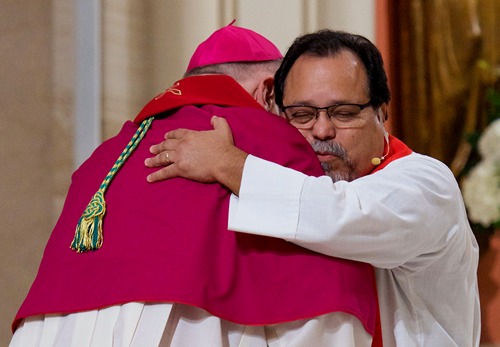
Photographer: Rev. Keith Spencer
Archbishop Thomas Wenski, left, and Lutheran Bishop-elect Pedro Suarez embrace during the Common Prayer service for Reformation 500 at St. Mary Cathedral.
"Wonderful" was one of the most-used words when people summed up their feelings on Oct. 29.
"It's so wonderful to be here," said Mona Schraffa, attending as one of eight members of Trinity Lutheran Church in Pembroke Pines. "Wonderful that we're moving toward peace and helping humanity."
Danielle Charlot, who came with nine other members of St. John's Lutheran Church in Miami Shores, said she spent most of her life in Catholic churches before switching. She pronounced the Oct. 29 service "exquisite … We now see that we have more similarities than differences."
Besides Miami, Reformation 500 events took place this year in several lands and around Florida.
In March, St. Thomas University hosted a forum on "Healing Christian Divisions," with Catholic and Lutheran theologians speaking.
On October 1, the archdiocesan MorningStar Renewal Center dedicated a 40-foot prayer labyrinth built by Lutherans and Catholics over eight months.
In January, the Diocese of St. Petersburg held a joint commemoration of the Reformation, at Prince of Peace Lutheran Church in Largo.
The dioceses of Orlando and St. Augustine teamed up with Lutherans in June for a Reformation 500 commemoration, drawing more than 1,200 to the National Shrine of Mary, Queen of the Universe in Orlando.
And on Oct. 31, the 500th anniversary of the Reformation, Bishop-elect Suarez joined Bishop Frank J. Dewane of Venice for a prayer service at Emmanuel Lutheran Church in that city. More than 300 attended.
The Rev. Kathryn H. Carroll, one of the leaders in the prayer labyrinth project, voiced a mix of elation and determination after the Miami service.
"This was a culminating event, but it's not an ending," said Rev. Carroll, pastor of Christ the King Lutheran Church in Miami. "We celebrate all that has happened. And we dream of what can be."
Also see: What's next for Reformation 500 at local parishes.

Photographer: Jim Davis
Lutheran pastors fill a front pew at the Common Prayer service for Reformation 500 at St. Mary Cathedral. The man in black is the Rev. Frank Kopania, a Lutheran official from Darmstadt, Germany.
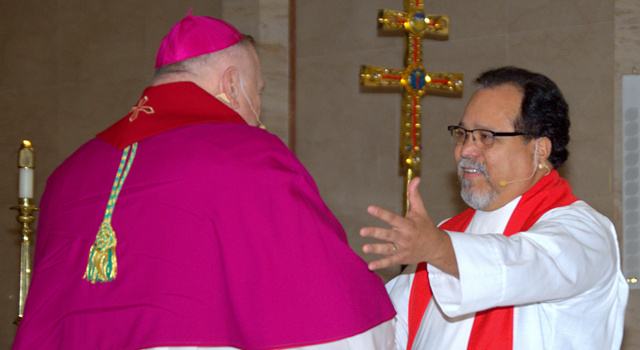

Comments from readers